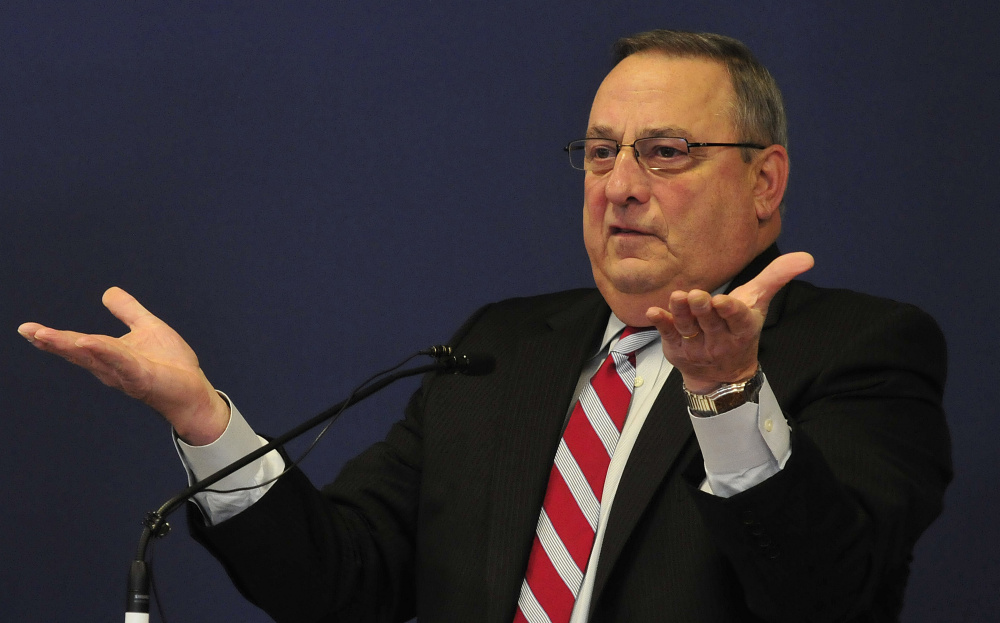Gov. Paul LePage said Thursday that Portland’s two-week old minimum wage ordinance violates federal law and implied that the city would be on the hook to reimburse employers.
City officials and an attorney who helped with the Portland ordinance responded by saying that the governor is misinterpreting federal law.
Both sides say federal officials are on their side.
LePage made his remarks to a crowd of about 60 business leaders who had gathered at Thomas College in Waterville for the Mid-Maine Chamber of Commerce’s Business Breakfast Series. The theme of LePage’s speech was “Moving Maine from Poverty to Prosperity,” and he cited Portland while criticizing an effort to raise Maine’s minimum wage.
“Let me tell you what’s happening,” LePage said. “Right now, Portland increased their minimum wage to $10.10. They are violating federal law. Now it is coming out shortly, (that) they got to pay all the money back to people, all the money that has been paid has to be paid back to employers since Jan. 1. It’s going to be a mess.”
An email from a U.S. Department of Labor spokesperson Thursday night didn’t clarify whether the tip credit that is part of Portland’s new minimum wage ordinance violates federal law, but did confirm that “the Wage and Hour Division has not conducted an investigation and found violations, nor is it taking legal action against the city of Portland.”
LePage has criticized Portland’s minimum wage before, including remarks that called it unconstitutional. However, it was unclear Thursday what he was referencing regarding the repayment of wages. His media staff didn’t respond to requests to interview the governor or for additional information and clarification.
‘TIP CREDIT’ HIGHER THAN $5.12
A LePage administration official in the Department of Labor said Thursday that the city’s ordinance violates federal law because the gap is now too large between the minimum wage and the base wage for tip earners such as waiters and waitresses.
Federal law requires a minimum wage of $7.25 an hour, but it also allows employers to pay tip earners such as waiters and waitresses as little as $2.13 an hour. If tip income doesn’t push overall earnings over the minimum, then an employer would have to pay the difference.
The gap between the federal minimum and the federal base wage is $5.12, a figure known as the tip credit.
The LePage administration argues that Portland’s minimum wage is illegal because it creates a $6.35 gap, or tip credit, which is larger than the one outlined in federal law.
Portland raised its minimum wage to $10.10 an hour on Jan. 1, but councilors ultimately decided against raising the tip earner base wage and left it where it had been before – $3.75 an hour.
In doing so, the difference between that base wage and the city’s $10.10 an hour minimum wage became $6.35.
Mayor Ethan Strimling said that LePage reached out to him personally last week to give him a heads-up that the state was looking into Portland’s minimum wage and the federal law. But Strimling also said he believes the city is on firm ground.
“At this point, we think we’re OK, but we’re trying to get confirmation about that,” the mayor said.
The city’s lead attorney, Danielle West-Chuhta, informed the state this week that she believes the ordinance complies with federal law. She referenced a U.S. Department of Labor website that lists several states that have tipped credits higher than $5.12.
A different attorney advising the city also said the local minimum wage is legal because it meets the requirement that the base wages for tipped workers is above the federal minimum of $2.13.
“The violation of the federal law would be taking a tipped credit of more than $5.12 against a $7.25 minimum wage, because then you wouldn’t be paying the required $2.13,” said Glenn Israel, an attorney who has been helping the city with the its minimum wage ordinance.
‘PROCEED AT YOUR OWN RISK’
Maine Department of Labor spokeswoman Julie Rabinowitz disagreed, saying “there appears to be a federal issue with the tipped credit” in Portland.
She said the state has no authority to enforce federal law, but officials are concerned that Portland employers could be held liable for the city’s mistake, should employees file a federal labor complaint.
If a complaint is made, the U.S. Department of Labor could conduct a full audit of a business, she said.
“We don’t want business to believe they’re doing the right thing then have a complaint, maybe on an unrelated issue,” she said.
Rabinowitz said the state will be posting information on its website encouraging business owners to contact the regional U.S. Department of Labor office for advice about how to best comply with federal law.
“It’s basically: Proceed at your own risk,” she said. “We want to err on the side of caution.”
The tipped credit has been a recurring source of confusion surrounding Portland’s minimum wage, the first such ordinance in the state.
When it first enacted its ordinance, the City Council accidentally kept the tip credit at $3.75, meaning the base wage for tipped workers would have increased to $6.35 an hour, the difference between $10.10 and $3.75.
The council admitted that was a mistake and revised the ordinance to eliminate any change in the base wage, keeping it at $3.75 an hour.
Meanwhile, Portland restaurateurs are once again caught in the middle of conflicting interpretations of labor law.
“It would be nice to see some agreement between all parties,” said Greg Dugal, executive director of Maine Restaurant Association. “It’s a simple interpretation thing that needs to be resolved.”
Morning Sentinel Staff Writer Peter McGuire contributed to this report.
Send questions/comments to the editors.



